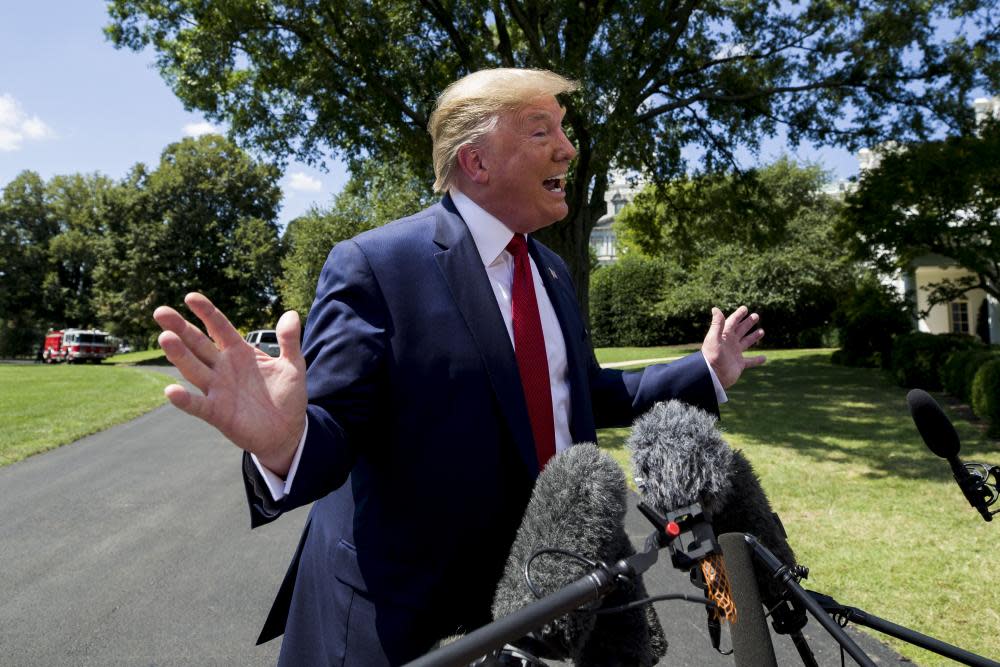Trump revels in 'chopper talk' as White House press lectern gathers dust

Stephen Colbert, the late night TV host, dubs it “chopper talk”.
In a now familiar ritual, Donald Trump emerges from the Oval Office, walks down a driveway and engages in a three-way conversation with a melee of reporters and the whirring engine of the Marine One helicopter awaiting his departure.
Related: Washington's great mystery: Trump’s affinity for Putin and populists baffles experts
Yet less than a minute’s walk away, the White House press briefing room sits silent with dust gathering on the lectern. On 11 September, it will be exactly six months since Trump’s press secretary last stood at that lectern to deliver a briefing to the waiting media.
The shift in how the administration communicates happened gradually at first but now seems set in stone. Press secretary Sarah Sanders departed in June and was succeeded by Stephanie Grisham, who has not held a single briefing so far and has shown no appetite for doing so.
Trump, meanwhile, has embraced the notion that he is own best spokesman. His freewheeling riffs at set-piece events, and especially before boarding Marine One, allow him to pick and choose his questioners, air multiple grievances and give the impression of transparency while skating past substantive policy discussion.
He particularly likes the format because he gets whatever he wants and we frequently don’t
Andrew Feinberg, Breakfast Media
As of last Tuesday, Trump had held two formal solo White House press conferences, 38 joint press conferences with foreign leaders, and 205 press availabilities at photo ops, departures, arrivals and on Air Force One, according to Mark Knoller, a CBS journalist who keeps White House statistics.
At the same stage in presidency, Barack Obama had held 17 solo White House press conferences and 44 jointly with foreign leaders but just 24 other press availabilities.
Some journalists welcome the opportunity to question the principal directly. Jon Decker, the White House correspondent of Fox News Radio and a regular at Trump’s chopper talks, recalled: “Two or three weeks ago I got three questions in to the president and each of the answers satisfied me and in some way made news.”
But Decker expressed regret over the demise of the daily press briefing. “In an ideal world we’d have an opportunity to question the president and the press secretary. Each cable network broke away to run the press briefing: the White House is missing an opportunity to own 20 minutes every day. It’s an opportunity to ask follow-up questions – not something the president typically does.”
Other journalists are less content about Trump’s availabilities on the south lawn close to the mechanical moan of Marine One.
Andrew Feinberg, a White House reporter for Breakfast Media, said: “They’re structured in such a way that they’re almost irrelevant. They keep the engine running, which apparently they don’t have to do, and it’s set up in a way the president can just wander up and down the role line, picking the reporters he recognizes off TV and the questions and topics he likes while ignoring any question that might call for a little effort to put out a coherent answer.”
He went on: “Because it’s hard for the audio to pick up the question, people at home often don’t hear it, only him rambling. He particularly likes the format because he gets whatever he wants and we frequently don’t because of what happens trying to ask questions in front of a running helicopter engine.”
Feinberg added: “It’s a way for the president and administration to cloak themselves in the mantle of transparency while providing little useful information.”
Trump’s defenders argue the encounters show that he is more accessible than any of his predecessors. Critics, however, argue his answers are so full of lies and contradictions that they are next to useless. A stark example came last week when Trump delivered a bizarre 35-minute word salad about gun control, Russia, taxes, a recession, Greenland, disloyalty to Israel and the trade war with China (“I am the chosen one”).
It is all yet another way in which Trump has rewritten rules of the presidency.
It looks as though they’ve completely abandoned any pretence of trying to keep the president focused or on message
Chris Whipple
Chris Whipple, author of The Gatekeepers: How the White House Chiefs of Staff Define Every Presidency, said: “I don’t think it serves anybody to have the president go out to deliver 35-minute rants on 20 different subjects. It looks as though they’ve completely abandoned any pretence of trying to keep the president focused or on message. That’s chief of staff malpractice. Is there anybody on the staff who can tell the president when he’s unhinged?”
Whipple noted that when Ronald Reagan was president, helicopter noise was a useful way of keeping him on message: he would make remarks but not be able to hear questions that could lead him into gaffes.
“The chief of staff got the helicopter to rev up the engine so Reagan couldn’t hear questions,” he said. “Otherwise there was the danger he would answer questions they didn’t want answered that day. If Mick Mulvaney [now acting chief of staff] had any sense, he would signal to the air force pilot to rev up the engine to drain Trump out.”
Mike McCurry, who was press secretary to former president Bill Clinton in the 1990s, said: “The job doesn’t exist any more in the conventional way it did in the past because they don’t have a briefing. The title doesn’t really mean anything any more.”
Trump’s chopper talk is no substitute, McCurry added. “When you just go out and make shit up, that doesn’t really count.”

